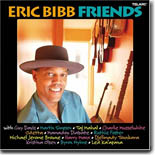|

Eric Bibb
Friends
Telarc

Have you grown weary of
hearing the same old tired blues tracks that way too many performers are
recording today?
Then take a listen to the
very nice Friends, a collection of tunes by American expatriate
artist Eric Bibb, who now calls Sweden his home.
Bibb, son of the 1960s folk
singer Leon Bibb, gathered 13 of his musical "friends" for the recording
of this album, thus the title. But this is not the normal star-studded
attempt to cash in on the names of celebrities to sell more CDs.
Instead, Friends keeps Bibb in the forefront of each song, yet
imports the unique musical personality of each guest artist to craft a
beautiful patchwork quilt of an album.
Friends starts with a
rambunctious version of the traditional gospel number "99 1/2 Won't Do,"
with Bibb and the gruff-voiced Guy Davis both playing 12-string guitar
and trading off on vocals. It's a powerful number that's very well done
by these two New York City natives.
Charlie Musselwhite joins in
with Bibb and backing band on the dirge-like "Six O'Clock Blues," with
Musselwhite playing harmonica.
Taj Mahal makes the first of
his two appearances on Friends, as he and Bibb trade off on
guitar and vocals on "Goin' Down Slow." This classic blues number is
given more of a down-home, string band sound by the fiddle accompaniment
of Michael Jerome Brown.
While Taj doesn't appear on
the next cut, "Lovin' In My Baby's Eyes is one of his compositions and
Bibb acquits himself well on vocals, sounding much like a younger Taj
Mahal. What makes this number really stand out is the wonderful string
work of African instrumentalist Mamadou Diabate, who plays the kora, a
21-string West African harp-lute. The effect is stunning, making one
wish that this instrument was used more often on modern blues
recordings. For my money, this cut's the best of the bunch here. It's
one that I want to hear over and over.
Bibb teams with Austin,
Texas singer Ruthie Foster on the gospel-ish, jazzy original ballad "For
You," a song that verges of getting too syrupy at times, but still
works. Janne Petersson contributes tasteful piano accompaniment.
Exquisite guitar picking is
what highlights the folksy Guy Clark composition, "The Cape," on which
Martin Simpson guests on guitar and slide guitar.
The legendary Odetta, who is
attributed by Bibb as one of his earliest musical inspirations, shares
vocals on "Tain't Such A Much," a song that the two co-composed. Bill
Lee's jazzy string bass work nicely compliments Bibb's guitar playing on
the instrumental breaks.
Bibb previously recorded the
traditional inspirational folk song "Needed Time" on his 1999 release
Spirit and The Blues, but he takes this precious song in a different
direction here, with Canadian guitarist Harry Manx accompanying him on
the mohan veena (an Indian lap-style guitar). The song gets a true
international flavor with the percussion work of Kuljit, who pounds out
a steady beat on the tablas, an instrument with origins in North India.
Moving in a different
direction is the simple but incredible "If I Stayed," which features
singer/songwriter Kristina Olsen accompanying the pair's vocals on the
concertina. This one's got a real flavor of the British Isles.
Bibb sings what could be a
somewhat autobiographical folk song in "Connected," with Montreal
multi-instrumentalist Michael Jerome Browne backing him on mandola and
slide guitar.
Canadian violinist and
mandolin player Byron Myhre joins Bibb on another understated number,
"Ribbons and Bows," which is framed nicely by Janne Petersson's
accordion accompaniment.
Browne returns to take the
lead on his own "Just Look Up," playing 12-string guitar and trading
vocals with Bibb. There's a touch of traditional gospel on this "feel
good" tune. Bibb does some of his best singing on this tune, albeit
generally in support of Browne's lead vocals.
Bibb sings one of his
original compositions, "Cowgirl Queen," on which he is joined by veteran
Hawaiian artist Led Ka'apana on electric ukelele.
The instrumental medley "Kulanjan
/ Sebastian's Tune" evolved from an impromptu jam session with Taj Mahal
and Mali instrumentalist Djelimady Tounkara, both soloing on borrowed
instruments. Taj lays down some mighty fierce licks on an acoustic arch
top guitar as well as fretless gourd banjo, while Tounkara borrowed a
Gibson guitar for his solo. The result is another wonderful number with
a real international flavor.
Friends closes with a
slow, mellow number, "Dance Me to the End of Love," with subtle
accompaniment from Arkansas pianist Jerry Yester.
This disc is noteworthy
because, like Bibb himself, it consistently dares to be different.
Friends should appeal to lovers of both traditional blues and
singer/songwriter folk music.
--- Bill Mitchell
|


![]()